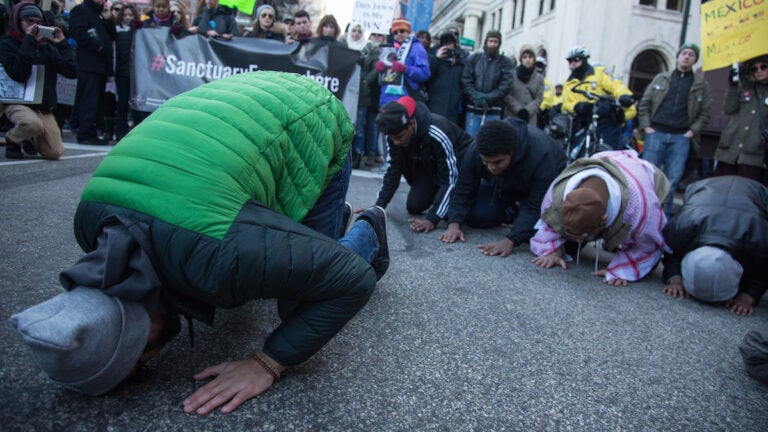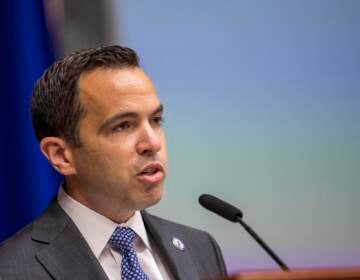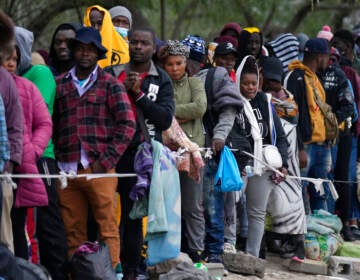‘People can breathe easier’: Philly immigration advocates react to Biden executive orders
Some are hopeful. Some are cautious. Some said simply having a president who is not actively hostile to immigrants could have a major positive effect.

Abdulazeem Sheikh, 22, leads others from the group Young Muslims in afternoon prayer. Thousands of protesters gathered at Thomas Paine Plaza for a March for Humanity in support of refugees and immigrants in Philadelphia on Feb. 4, 2017. (Emily Cohen for WHYY)
In late January 2017, Philadelphia City Councilmember Helen Gym was celebrating Lunar New Year with her family when she got a call from a member of Mayor Jim Kenney’s team asking for her help.
Days into his term, President Donald Trump had just issued a travel ban for seven majority-Muslim countries, and now some people were being detained at Philadelphia International Airport — could Gym gather a crowd and get out there to protest?
“I put out a call on social media and texted some friends,” Gym said. “[But] by the time I arrived at the airport there were hundreds of people who came out.”
The travel ban, which was later upheld by the U.S. Supreme Court, marked the beginning of Trump’s aggressive actions to limit immigration and more heavily police immigrants already in the U.S.
In the years since, Gym and fellow immigration advocates estimate they took to the streets hundreds more times to push back.
With Wednesday’s inauguration of President Joe Biden, many see new hope for policies that reverse Trump’s efforts. Within a few hours of becoming president, Biden signed a slew of executive orders, including ones that will officially end Trump’s travel ban and expand protections for those who came to the U.S. illegally as children. Another makes it more difficult for immigration agents to make arrests.
For Gym, the moment was in large part the product of the last four years of organizing and protesting.
“People fought hard to get Joe Biden elected. Immigrants in particular,” she said.
Other prominent figures in Philadelphia’s immigrant advocacy community were also celebrating on Wednesday, even as they cautioned that there was much more work to be done.
“We are excited to be moving on from the time of an administration that targeted immigrants and scapegoated immigrants,” said Steven Larín, deputy director of the Nationalities Service Center.
Larín said some of his clients have been separated from loved ones for years by the Trump administration’s restrictive immigration policies, including those which allowed in far fewer refugees than previous administrations.
In 2020, the cap on refugee admissions was 18,000, the lowest since 1980. President Biden has pledged to raise the refugee cap to 125,000.
“That’s definitely one of the areas where people are excited about the opportunity to pursue legal relief in court,” Larín said.
President Biden also plans to push an immigration reform bill that would provide a path to citizenship for the 11 million people living in the United States without legal status. The proposal will be an early test for how Biden will negotiate with lawmakers across the aisle on contentious issues. Democrats hold a razor-thin advantage in Congress. Biden will need to find Republican votes in the Senate to overcome the filibuster and deliver on immigration reforms that have proven elusive for decades.
Still, some advocates said simply having a president who is not actively hostile to immigrants could have a major positive effect.
“The last four years have been so devastating, not just because of the policy, but because of the hatred dripping from all the executive orders signed by the prior president,” said Cathryn Miller-Wilson, executive director of the nonprofit immigrant and refugee social services agency HIAS-PA.
Miller-Wilson said she still remembers getting woken up early on a Sunday morning in 2018 by a call from a local church where one of her clients, a musician, was set to play at service.
The client, who had overstayed his visa but committed no other crime, had been arrested as he unloaded his van by a U.S. Immigration and Customs Enforcement agent.
“That is terrifying,” said Miller-Wilson. “So the fact that [Biden’s executive order limiting ICE] means people can breathe easier, can participate in life without fear of being disappeared… is huge.”
Under President Barack Obama, ICE deprioritized deporting people without criminal records who had been in the U.S. for years and had citizen family members. Although the text of Biden’s order hasn’t been fully released, it’s expected to reverse Trump’s decision to allow ICE arrests in many more cases.
Some advocates, though, are underwhelmed by plans to return to a pre-2016 mindset.
Erika Guadalupe Núñez, executive director of the South Philadelphia-based immigrant rights organization Juntos, is skeptical Biden will be meaningfully better than his predecessor.
“What this moment requires is bold and dramatic changes,” she said. “Undoing some of what Trump has done isn’t enough.”
Núñez said she would like to see Biden abolish ICE and end deportations. While Biden has signaled that he will not abolish the agency, he has publicly committed to a 100-day moratorium on expelling people from the country.
For Helen Gym, Wednesday didn’t just bring relief. It was the first time in four years, she said, that she could finally let herself mourn the battles lost: asylum-seekers turned away, kids locked in cages, children taken from their parents.
“I didn’t feel like I could grieve before when people were dying and families were being separated,” she said.”I feel like [now] there is a chance to grieve a little bit. And then to pick up, and push further.”

Get more Pennsylvania stories that matter
WHYY is your source for fact-based, in-depth journalism and information. As a nonprofit organization, we rely on financial support from readers like you. Please give today.









